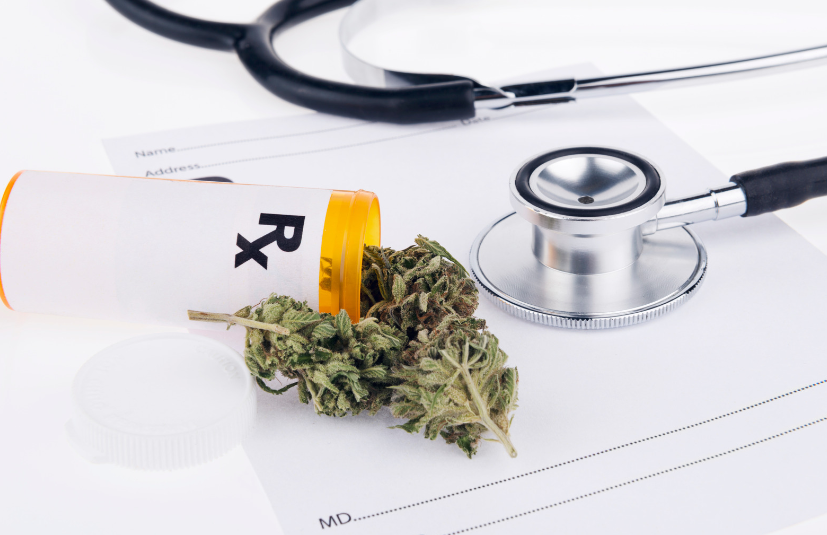Medical Marijuana for Multiple Sclerosis Patients
- ARCannabisClinic
- Sep 4, 2023
- 12 min read
The evolution of medical marijuana in treating various medical conditions, notably multiple sclerosis (MS), has been nothing short of revolutionary. As spinal cord and nerve fibers come under attack in MS, patients experience a range of ms symptoms including muscle spasms, neuropathic pain, and more. While the American Academy of Neurology and numerous healthcare providers are exploring this avenue, the journey of cannabis use, specifically for ms patients, needs a comprehensive look. This blog aims to explore that trajectory.

Table of Contents:
A Journey Through Time: Evolution of Medical Marijuana in MS Management
Over the decades, the relationship between Multiple Sclerosis (MS) and medical marijuana has been both profound and multifaceted. Let's embark on a journey to trace this intricate history.
From ancient texts to modern clinical trials, the cannabis plant has been interwoven with humanity's quest to alleviate ms symptoms. In ancient times, civilizations utilized cannabis for its potential therapeutic properties, from pain relief to tackling muscle stiffness.

As years rolled into centuries, the psychoactive effects of the cannabis plant became a double-edged sword. While its medicinal uses persisted, its psychoactive effects led to controversies, resulting in prohibitions in many regions, including the United States. However, these prohibitions shadowed genuine potential benefits for MS patients. Chronic pain, muscle spasms, and cognitive symptoms of MS, which troubled patients, found potential relief with the use of medical cannabis.
By the 20th century, as scientific studies advanced and our understanding of diseases like MS deepened, researchers began revisiting the cannabis plant. The American Academy of Neurology and many other organizations initiated clinical trials to test the efficacy of cannabis in alleviating MS symptoms. Over time, the active ingredients of the cannabis plant, including CBD oil, were isolated and studied in-depth for their potential benefits in MS treatment.
These efforts bore fruit in places like the United Kingdom, where systematic review of evidence culminated in the approval of oromucosal sprays, helping patients combat muscle spasticity. The story wasn't much different in parts of the United States, where individual states recognized the potential of medical marijuana for improving the quality of life for ms patients.
However, every silver lining comes with its cloud. The progression of the disease, coupled with the adverse effects of overuse or misuse of medical marijuana, underscored the need for proper guidance and prescription. It led to a more structured approach towards medical marijuana's application. Patients needed assistance to get the right strain, dosage, and even understand the ratio of THC to ensure that their treatment was not just effective but safe.
Today, with the amalgamation of traditional MS treatments and evolving cannabis therapies, MS patients are better equipped to make informed decisions about their treatment options. They can consult healthcare providers, delve into the resources provided by organizations such as the National Multiple Sclerosis Society, and even take the pre-qualification survey to understand if medical marijuana could be a suitable option for them.
In an age where information is at our fingertips, it is essential to remember our journey and the strides made in MS management using medical marijuana. With every new clinical study and patient testimonial, the promise of a brighter, pain-free future for MS patients becomes clearer.
Key Takeaway: Understanding the historical perspective of medical marijuana in MS management is pivotal. It offers a lens to see how traditions and modern clinical trials converge, promising a better quality of life for MS patients.
The Integration of Medical Marijuana in Modern MS Care
The intersection of medical marijuana and the management of Multiple Sclerosis (MS) paints a vivid picture of the progress medicine has achieved in recent decades. A path paved by rigorous clinical trials, ongoing research, and the testimonials of countless ms patients has shaped this transition.

Historically, the cannabis plant was primarily associated with recreational use, overshadowing its potential medicinal properties. Today, however, the scenario is starkly different. There's increasing recognition of the pivotal role medical marijuana can play in enhancing the quality of life for those battling MS.
The list of MS symptoms that can be potentially alleviated by the use of medical cannabis is comprehensive. From neuropathic pain, muscle spasms to the cognitive issues that often plague MS patients, the cannabis plant offers a beacon of hope. The active ingredients within cannabis, especially CBD oil, have displayed promising results in reducing muscle stiffness and improving overall cognitive function.
This paradigm shift in the acceptance of medical marijuana in MS care was not without its challenges. The psychoactive effects of THC, one of the active compounds in marijuana, raised concerns. But with advancements in extraction technologies and the precise separation of cannabinoids, healthcare providers can prescribe formulations with reduced psychoactive effects, focusing instead on the therapeutic properties.
Moreover, the American Academy of Neurology has indicated potential benefits of cannabis products in treating specific symptoms of multiple sclerosis. Their endorsement and the positive effects reported by study participants in various clinical studies further cemented cannabis's role in MS management.
For MS patients seeking to explore this treatment avenue, acquiring a medical marijuana card is often the first step. This process, while straightforward in many states, requires guidance. Patients can find useful resources on how to get a marijuana card and gain a deeper understanding of their state-specific conditions.
However, while the positive effects of cannabis in MS care are evident, it's paramount for patients to consult their healthcare provider before making any decisions. Medical marijuana is a tool in the vast arsenal of MS treatments. Integrating it should be a decision based on individual symptoms, other ongoing treatments, and the potential for drug interactions.
In conclusion, the journey of integrating medical marijuana into modern MS care is a testament to the power of research, patient advocacy, and the relentless pursuit of improving patient outcomes. While challenges remain, the potential for a brighter future for MS patients shines through.
Key Takeaway: The inclusion of medical marijuana in MS management reflects a broader, patient-centered approach in modern medicine, emphasizing the importance of holistic treatments and the individual needs of the patient.
Medical Marijuana versus Conventional Therapies: A Comparative Study for MS
The evolution of treatments available for Multiple Sclerosis (MS) reflects a broader push within the medical community towards innovative, patient-oriented solutions. At the forefront of this transformation is medical marijuana. Its integration into therapeutic practices challenges conventional treatment modalities, leading to a pivotal question: how does medical marijuana compare to traditional MS therapies?

To truly understand this, one must delve into the multi-faceted ways MS impacts an individual. Symptoms can range from neuropathic pain and muscle spasms to more elusive ones like fatigue and cognitive issues. Each treatment, be it conventional or alternative, aims to address these symptoms, hoping to enhance the patient's quality of life.
Conventional therapies for MS primarily revolve around disease-modifying treatments (DMTs), corticosteroids, muscle relaxants, and other pharmaceutical interventions. These treatments, backed by years of clinical research, have their merits. They're known to reduce relapses, manage symptoms, and delay disease progression. However, potential side effects, the need for frequent monitoring, and their impact on the patient's overall well-being are concerns that often arise.
Enter medical marijuana. Its active components, THC and CBD, have demonstrated potential benefits in mitigating several MS symptoms. Studies have shown that medical cannabis may reduce muscle stiffness, alleviate neuropathic pain, and even improve sleep quality.
One crucial advantage medical marijuana offers is the potential reduction in the number of medications an MS patient might need. By addressing multiple symptoms at once, it could simplify a patient's treatment regimen. However, it's essential to understand that medical marijuana doesn't replace the need for DMTs or other core treatments for MS. Instead, it complements them, offering symptomatic relief.
For those considering medical marijuana as part of their treatment, acquiring a medical marijuana card is essential. How to apply for a medical marijuana card varies state by state, but resources are available to streamline the process.
In essence, while conventional therapies have a proven track record and remain crucial for MS care, medical marijuana's emergence offers patients an additional tool. It's not about replacing conventional treatments but enhancing the therapeutic landscape for MS patients.
Key Takeaway: Medical marijuana isn't seeking to replace conventional MS therapies but aims to broaden the spectrum of treatments available, offering a holistic approach to patient care.
Fine-Tuning Treatment: Selecting the Right Strain and Dosage for MS Patients
The rise of medical marijuana as a therapeutic option for Multiple Sclerosis (MS) brings about a new set of considerations for both patients and healthcare providers. Chief among these is the matter of selecting the right strain and determining an optimal dosage. Much like how a physician would consider the type and dose of a conventional drug, medical cannabis requires the same meticulous attention to ensure effectiveness and minimize potential side effects.

A myriad of cannabis strains exist, each with unique compositions of cannabinoids, the primary active compounds in the plant. THC and CBD, the most studied cannabinoids, have demonstrated potential in relieving various MS symptoms, from spasticity and pain to fatigue. But it's not just about THC and CBD; the terpenoid and flavonoid profiles of a strain can significantly influence its therapeutic properties. For instance, the strain that aids in reducing muscle stiffness might differ from one that improves sleep quality.
When starting on medical cannabis, there's rarely a one-size-fits-all answer. A strain effective for one patient might not yield the same results for another. Hence, it often becomes a process of trial and observation. The National Multiple Sclerosis Society recommends initiating treatment with a lower dose and gradually adjusting based on the patient's response and symptom relief.
To embark on this therapeutic journey, one of the initial steps involves getting a medical marijuana card. This document becomes a gateway to accessing various strains and formulations available at medical marijuana dispensaries. Once acquired, a collaborative approach between the patient, physician, and dispensary staff can help in identifying a strain that aligns best with the patient's needs.
It's also worth noting that the method of consumption - be it smoking, vaping, tinctures, or edibles - can influence the effect and duration of relief. Furthermore, consistency is vital. As with any medication, skipping doses or inconsistent usage can affect the overall therapeutic outcome.
Lastly, while medical marijuana offers a promising avenue for symptom relief, it's essential to communicate openly with healthcare providers about its use, especially if other medications are in the mix, to prevent potential drug interactions.
Key Takeaway: Selecting an appropriate strain and dosage of medical marijuana is a personalized journey, requiring collaboration, observation, and adjustment to ensure optimal symptom relief for MS patients.
Doctors Weigh In: The Current Consensus on Medical Marijuana for MS Treatment
The therapeutic potential of medical marijuana in treating a multitude of conditions, including Multiple Sclerosis (MS), has captured significant attention in the medical community. As more states have legalized its use, more patients and physicians have considered this alternative treatment. So, where does the medical community stand on cannabis for MS?

A prominent marker of its acceptance is the fact that many states list MS as one of the marijuana card qualifying conditions. This inclusion signifies a recognition that cannabis may offer therapeutic benefits to MS patients.
Clinical studies have indicated the effectiveness of cannabis in alleviating symptoms like spasticity, pain, and fatigue. The National Multiple Sclerosis Society has acknowledged these findings but also emphasizes the need for more extensive research, especially in understanding long-term effects and potential interactions with other MS medications.
However, not all physicians are on board. Some doctors express concerns about the long-term effects of cannabis use, especially given that MS is a lifelong condition. Concerns revolve around cognitive decline, potential dependency, or interference with other treatments. Yet, many physicians recognize its value as part of a comprehensive treatment plan, especially for patients who haven't found relief with conventional therapies.
For those exploring this avenue of treatment, it's essential to consult with a medical professional experienced in cannabis therapy. Establishing a treatment plan, identifying the right strain, and determining an effective dose is crucial. Patients can then proceed with getting a medical marijuana card, facilitating access to various strains and formulations tailored for MS.
The consensus? While many doctors acknowledge the potential benefits of medical marijuana for MS, they also stress the importance of patient education and careful management. As with any treatment, the pros and cons need thorough consideration, making patient-doctor communication vital.
Key Takeaway: The medical community's stance on medical marijuana for MS is evolving. While many recognize its therapeutic potential, there's also a call for more research and a holistic approach to ensure patient safety and efficacy.
FAQ
What is Multiple Sclerosis (MS)? Multiple Sclerosis (MS) is an autoimmune disease that primarily affects the spinal cord, optic nerves, and the broader central nervous system. It's characterized by symptoms including muscle spasms, neuropathic pain, and cognitive issues.
How has medical marijuana's role evolved in MS management over time? Historically, the cannabis plant has been used for various medicinal purposes. However, its modern resurgence, especially in the United States and United Kingdom, is attributed to clinical trials and studies indicating its potential benefits in alleviating symptoms of multiple sclerosis.
Can medical marijuana integrate with modern MS care? Yes, many healthcare providers and studies have shown that the active ingredients in the cannabis plant, especially when administered as oral cannabis extract or cbd oil, can positively integrate with modern MS treatments to improve quality of life.
How does medical marijuana compare to conventional MS therapies? While traditional medications and physical therapy remain fundamental in managing MS symptoms, the use of medical cannabis has shown potential benefits, especially in pain relief and reducing muscle spasticity. However, its efficacy compared to traditional methods still requires further research.
How do patients select the right strain and dosage of medical marijuana for MS? Selection relies heavily on the specific ms symptoms, the progression of the disease, and advice from a reputable healthcare provider. Different cannabis strains and the ratio of THC can produce different effects, so a tailored approach is crucial.
What is the current consensus among doctors regarding medical marijuana for MS? The American Academy of Neurology and several other bodies have identified strong evidence supporting the benefits of medical marijuana for MS. However, a unanimous consensus is pending as professionals weigh potential side effects against medical benefits.
Is medical marijuana legal for MS patients in the United States? The legal status varies by state. While many states have approved the use of medical marijuana for a range of medical conditions, including MS, it's essential for patients to verify their state's specific regulations.
What are the main psychoactive effects of the cannabis plant? The primary psychoactive effects come from THC, one of the active compounds in the cannabis plant. These effects can vary from euphoria to altered cognitive function, depending on the strain and dosage.
Are there adverse effects associated with the use of medical cannabis for MS? Yes, like any treatment, there can be potential side effects. These may include cognitive impairment, dizziness, or adverse reactions with other medications. It's crucial to consult a healthcare provider before starting any treatment.
How does the endocannabinoid system relate to MS treatment with cannabis? The endocannabinoid system plays a vital role in regulating various bodily functions. Cannabinoid receptors, part of this system, interact with active ingredients in the cannabis plant, potentially offering relief from some ms symptoms.
What are the benefits of CBD oil in MS treatment? CBD oil has anti-inflammatory properties and has shown potential in providing pain relief, reducing muscle spasticity, and improving overall quality of life in ms patients without the psychoactive effects of THC.
What does the National Multiple Sclerosis Society say about medical marijuana use? The National Multiple Sclerosis Society recognizes the potential benefits of medical marijuana in symptom management for MS. However, they also emphasize the need for more comprehensive clinical studies and research.
Can medical marijuana help with muscle stiffness in MS patients? Yes, several studies and patient testimonials indicate that medical marijuana can help alleviate muscle stiffness, providing a potential increase in mobility and comfort.
How is oral cannabis extract different from other cannabis products? Oral cannabis extract is a concentrated form of the active ingredients in the cannabis plant, often taken in capsule form. Its standardized nature can provide more consistent dosing than other cannabis products.
What's the importance of cannabinoid receptors in MS treatment? Cannabinoid receptors interact with the active compounds in cannabis. Their stimulation can lead to potential benefits in alleviating chronic pain, muscle spasms, and other symptoms of MS.
Do all MS patients react the same way to medical marijuana? No, reactions can vary based on the individual's immune system, the progression of the disease, and other factors. It underscores the importance of a personalized treatment approach.
Is there enough evidence to support the use of medical marijuana for cognitive symptoms of MS? While some studies show potential benefits, more research is needed to conclusively determine the efficacy of cannabis in treating cognitive symptoms of MS.
How do traditional medications for MS work in comparison to cannabis? Traditional medications often focus on slowing disease progression, managing relapses, and symptom relief. While cannabis primarily addresses symptom management, it can work in conjunction with traditional treatments.
Do clinical trials support the benefits of medical marijuana for MS? Several clinical trials have indicated potential benefits, especially in symptom management. However, the medical community emphasizes the need for further research to ascertain long-term effects.
Are there any dietary or lifestyle changes that can enhance the effectiveness of medical marijuana for MS? While a balanced diet and healthy lifestyle are always beneficial, there's no specific dietary change proven to enhance the effectiveness of medical marijuana for MS. Always consult with a healthcare provider before making any significant changes.
Conclusion:
As the landscape of medical marijuana continues to evolve, ensuring safe and effective access is crucial. Enter ARCannabisClinic, a national pioneer that not only facilitates legal access to medical marijuana across states but also offers an industry-leading MMJ Therapy Visit. This personalized consultation with cannabis experts provides patients with a robust medical marijuana treatment plan, outlining strains, ratios, and dosing instructions. Beyond merely prescribing, ARCannabisClinic goes a step further by offering full diagnosis evaluations, encompassing PTSD, anxiety, and general medical evaluations. This holistic approach eliminates the need for patients to scavenge for outside medical records. In a realm where precision, trust, and expertise matter, ARCannabisClinic emerges as the touchstone for all matters related to medical marijuana.


